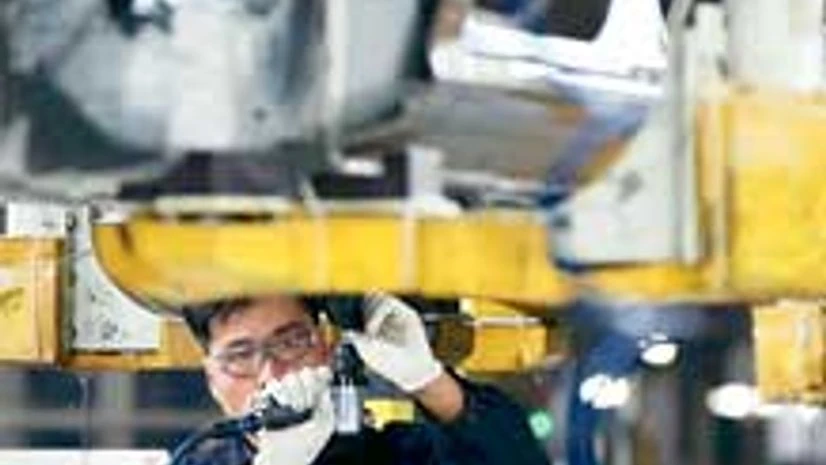Efforts by China to halt a slide in economic growth and fend off a potential credit crisis may be paying off, judging from the latest results of a closely watched survey of the country's manufacturers.
The HSBC Flash China Manufacturing Purchasing Managers' Index rose in August to 50.1, its highest in four months, as new orders rebounded. That was an encouraging turnaround from July's 47.7 reading, the weakest in 11 months. Any number over 50 means activity is expanding; below 50 represents a contraction.
Economists cheered the survey result as evidence that government efforts to arrest a rapid slowdown were starting to work, while cautioning that a strong rebound still appeared unlikely.
Beijing has launched a series of targeted measures recently to support the economy, including scrapping taxes for small firms, offering more help for ailing exporters and accelerating investment in urban infrastructure and railways.
"It confirms that the economy has stabilised in the short term," said Zhiwei Zhang, China economist at Nomura in Hong Kong.
A sub-index measuring new orders rose to a four-month high of 50.5 in August from 46.6 in July. The employment sub-index of the flash PMI also picked up, but still hovered below the 50 watershed line. But a sub-index on new export orders edged lower -- a reminder that global demand for Asia's exports remains sluggish.
WALKING A FINE LINE: GROWTH VERSUS REFORMS
China's pace of economic growth slowed to 7.5% in the second quarter, down from 7.7% in the three months ending March 31 and the ninth such deceleration in the last 10 quarters.
That's in line with the government's target of 7.5% growth this year, the slowest in 23 years, and Beijing has said it is willing tolerate slower growth as it pushes reforms designed to reduce pollution, social inequity and an over-reliance on debt-financed construction and exports.
But rapidly slowing growth has also been putting pressure on China's heavily indebted companies and provincial governments, raising concerns that the country's explosion in credit since 2008 may be on the verge of a meltdown.
"China still faces the major challenge of deleveraging its economy, said Jonathan Garner, a strategist at Morgan Stanley in Hong Kong.
"It's had a very rapid buildup in credit to GDP and a diminishing return to that credit expansion, and so productivity growth has been slowing."
Credit in China's economy almost doubled between 2008 and last year, pushing investment to 46% of GDP, much of that into infrastructure and property.
As fears of more bad loans grow, recent policy moves suggest China is preparing for a clean-up of its financial sector.
The China Banking Regulatory Commission has recently begun working with China's securities regulator to encourage the securitisation of loans to help lenders sell problematic loans and is developing a platform to help banks sell such loans to investors. That follows a move last year to let provincial governments set up their own debt-purchasing companies.
"As long as China's growth rate remains above 7%, there will be no crisis," Fan Jianping, chief economist at the State Information Centre, a top government think-tank, told reporters on Wednesday. He said annual economic growth may hover around 7.5% in the third and fourth quarters of 2013.
The improved PMI number reinforced recent signs that China's slowdown may be abating.
Annual profit growth in China's state firms picked up pace in the first seven months of 2013, official data showed on Tuesday. And data for July ranging from factory output and exports to retail sales was relatively positive.
But the flash HSBC PMI, compiled by Markit Economics Research, is the earliest available indicator of monthly activity in China's economy.
"This is mainly driven by the initial filtering-through of recent (government) fine-tuning measures and companies' restocking activities, despite the continuous external weakness," said Hongbin Qu, chief China economist at HSBC.
Investors remain wary of negative fallout for Asia if the US central bank begins to cut back its massive asset purchase programme, ending an era of cheap global financing.
Even China, which sets the exchange rate between its currency and the dollar and closely controls the flow of investments in and out of the country, had seen a surge in inflows from investors eager to take advantage of higher growth rates there.
Now, with growth accelerating and interest rates rising in the US as growth slows in China and elsewhere in Asia, funds are trickling back out. China saw capital outflows for the second consecutive month in July, suggesting its sluggish economy is still deterring investors.
The final HSBC PMI for August is due to be published on September 2, a day after the release of an official government survey. The official PMI, which focuses on big and state-owned firms, has been generally rosier than HSBC's private survey, which targets small and private companies.

)
